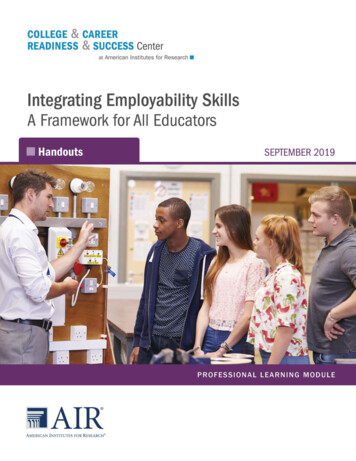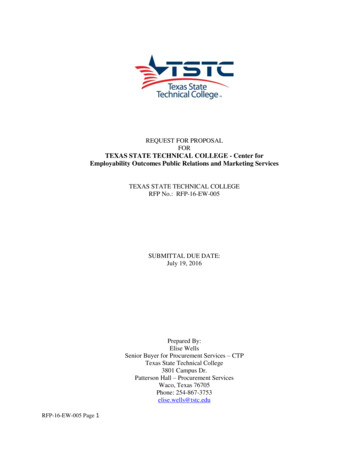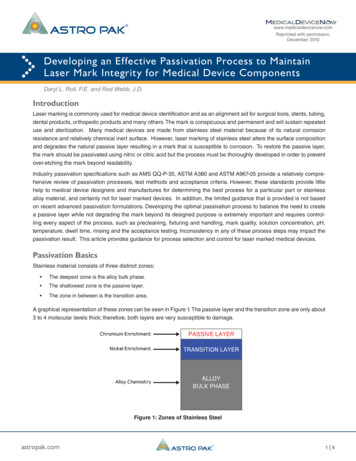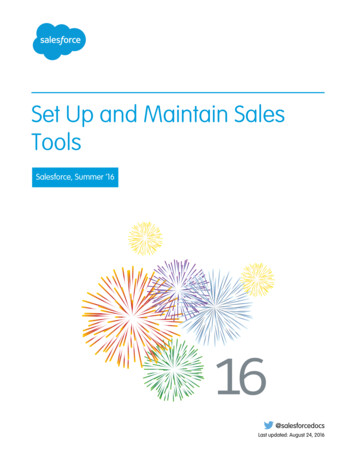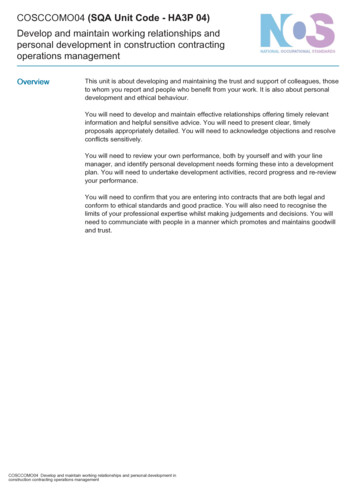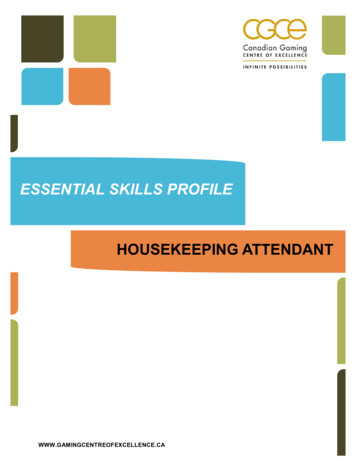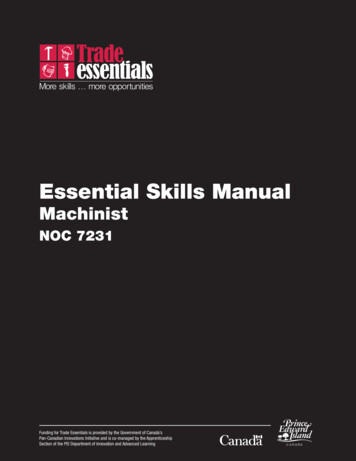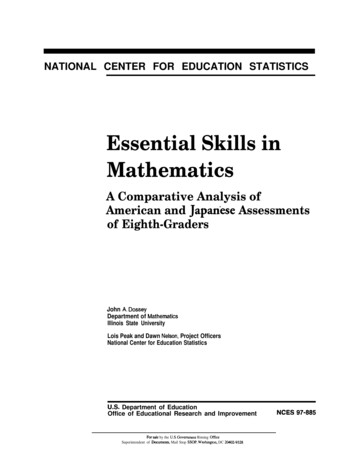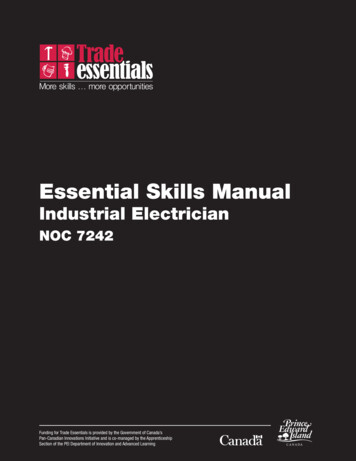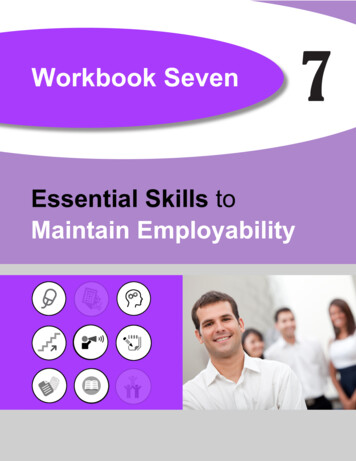
Transcription
Workbook SevenEssential Skills toMaintain Employability 7
This workbook was created by Literacy Link South Central. We are a regional network inOntario that provides support to literacy programs. We are a partner in the EmploymentOntario system. This series of workbooks is the result of a project called, “Connecting Literacyand Employment through Essential Skills.” These resources have been developed for peoplewho want to look for employment while strengthening their Essential Skills.Thank you to our project partners for their help in creating these resources.Our partners for this project include: Elgin, Middlesex, Oxford, Workforce Planning and Development Board Goodwill Ontario Great Lakes Literacy London Inc. London Employment Help Centre Pathways Skill Development & Placement CentreA special thanks to the employment agencies, literacy programs, employers and Essential Skillsexperts who participated in this project. Their feedback was valuable in the development ofthis workbook series.This project was funded in part by the Government of Canada’s Office of Literacy andEssential Skills.Content developed by Karen FarrarDesign by Tracy BuchkowskyThese workbooks can be downloaded free of charge at www.llsc.on.ca. Organizations areencouraged to copy these materials; however, reproducing these materials for a profit isprohibited. All website links were accurate at the time of printing – May 2011.
Read this Part FirstThis workbook is for you if: You’re looking for work. You have access to a computer with Internet. You feel comfortable using a computer and the Internet and you would like topractise and improve these skills. You want to build your Essential Skills.This workbook is one in a series of seven titles:1.Essential Skills to Identify the Job Searcher2.Essential Skills to Identify the Job3.Essential Skills to Research Your Occupation4.Essential Skills to Search for Jobs5.Essential Skills to Market Yourself with a Resume and Cover Letter6.Essential Skills to Market Yourself at the Interview7.Essential Skills to Maintain EmployabilityWhat are Essential Skills? Why are they important to you, the job seeker?Essential Skills are the skills you need for work, learning and life. Knowing your EssentialSkills helps you to tell employers what you can do for them. It shows people that you havethe skills to learn, that you adapt to change and that you can work well with others. A goodemployee has strong Essential Skills. When you practise and improve your Essential Skills,you increase your chances of finding a job.Why are these workbooks unique? These workbooks combine job search activities and Essential Skillsresources. You can look for a job and improve your Essential Skills – at thesame time. You can photocopy or download the copies you need – they’re free! The workbooks are self-paced. You can take as much time as you need and completeas many workbooks as you need.
How you will use Essential Skills for job searchYou will find that you use your Essential Skills for all of the job search activities in theseworkbooks. When you begin to read the content, you will notice that activities requiringEssential Skills are identified with icons and tips. The icons tell you which Essential Skills youwill be using. The tips tell you how you will use the Essential Skill for a specific activity.Essential Skills IconWhat It MeansReading: Understanding materials written in sentences orparagraphsExample: Read a case study about job search.Document use: Using and understanding labels, graphs, signs andother similar materialsExample: Fill in a chart of job search contact informationNumeracy: Using and understanding numbersExample: Budget your monthly expenses.Writing: Writing text or typing on a computerExample: Write a thank you note after an interview.Oral communication: Using speech to share thoughts andinformationExample: Practise answering interview questions with others.
Essential Skills IconWhat It MeansWorking with others: Interacting with others to complete tasksExample: Help to improve one another’s interview skills.Thinking: Reviewing information to make decisionsExample: Analyze how you spend your time during your job search.Computer use: Using computers and other technical toolsExample: Use the Internet for research.Continuous learning: Participating in an ongoing process of gainingskills and knowledgeExample: Learn to maintain a positive attitude during job search.
Computer SkillsAs you work through the workbooks you will be practising your computer skills. You musthave some basic computer skills in order to complete many of the workbook activities.Can you do the following? Use a mouse. Can you open links by clicking on them? Can you double click onfiles? Use a keyboard. Can you type? Can you type in a web address? Do you know howto use command keys like Shift and Control? Search the Internet. Can you use a search engine like Google or Internet Explorer?Can you use key words to find a specific topic? Search a website. Can you use the menus, links and tabs to find your way on awebsite? Watch an online video. Can you open, play and pause a video? Can you adjust thesound?If you are unable to perform these computer functions, you may wish to take some basiccomputer training before you use the workbooks.
Tips for making the workbooks work for youThese workbooks have been designed for job seekers who want to look for work and improvetheir Essential Skills.Here are some tips to help you get the most out of each workbook.Use the Essential Skills Checklist before and after you complete each workbook to seehow your Essential Skills improve.Read the Job Search Terms so that you are familiar with the terms used in eachworkbook.For best results, work through all the workbooks. They follow the steps you’ll takewhen looking for a job. But if you don’t need the information in every workbook, youcan just choose the ones with the content that is right for you.Try to work through the whole workbook and not just sections. This will increase yourunderstanding of the content and help you practise your Essential Skills.These workbooks have been designed for clients in both employment and literacyagencies. If you get stuck, ask for help.As much as possible, work with your colleagues (other jobs searchers in your program).You will practise your Essential Skills when you share information and ideas.Remember that these are your workbooks. This means that you can write in them,underline, highlight, make notes – anything that helps you to learn and get readyfor work.Improving your Essential Skills increases your chances of finding work. Good luck withyour job search!!tnemoylpmEniMainta
Workbook SevenWhen we are no longer able to change a situation, we are challenged to change ourselves.(Victor Frankl)Job search can be a challenging time in your life.You may find that when you get a job, it feels a bitlike crossing the finish line in a race. It’s a greataccomplishment and one you will feel proud of. Youwill have put in many of hours of work: researching,networking, writing resumes and cover letters andfollowing up. When you become employed youwill enjoy the benefits of your labour with a regularpaycheque. Your job search will be over.Well, yes and no. Career experts predict that mostworkers will have several careers before they retire.Workers who recognize this reality and prepare forit are going to be further ahead than those who doIn this workbookyou willlearn about: Managing change Setting goals Continuous learning Training Professional organizations Maintaining a healthy network Developing a portfolioThe unique skills, interests andexperience that you bring tonot prepare for these changes.your work are valuable to theSo how do you prepare for multiple jobs andimprove your skills and broadenemployer. When you continuallycareers? The most effective way to manageyour interests and experience,these changes is to continually work on youryou are ensuring your value asemployability.an employee now and into theEmployability, the focus of Workbook Seven, isabout making sure that you are always an effectiveemployee for the job that you are doing, as well asfor the next one. It is the ability to become employedand remain employed. Workbook Seven is aboutpractices that you can incorporate into your life asan employee that will keep you job-ready. You canwork on your employability even while you aresearching for a job. future.
Using Your Essential Skills for a Job SearchOne of the benefits of using this workbook series is that as you prepare for employment, youalso practise your Essential Skills. Essential Skills are the skills that enable you to carry out lifeand work tasks, including your job search. Practising and improving your Essential Skills willimprove your job search techniques and materials and increase your chances of finding workthat you want.In Workbook Seven you will use the following Essential Skills: Reading Document Use Writing Oral Communication Thinking Computer Use Continuous LearningYou can evaluate your confidence and progress in using these skills by assessing yourselfbefore and after you complete this workbook. Your self-assessment can show you the skills youfeel confident in using and the skills you need to practise more. This is important informationfor your job search and for your success as an employee.1.Take a few moments to complete the self-assessment on page 11 before youbegin the workbook activities. Assess your Essential Skills in the Before column.2.As you work through the activities, notice the icons and tips that help you to focuson particular Essential Skills.3.When you have completed the workbook, return to the Essential Skills Checklist.You will be able to measure your improved job search abilities using Essential Skillsby putting check marks in the After column.
Job Search TermsTermDefinitionChange managementThis is the ability to be flexible and continueto learn so that you are able to change whenyou need to.AssumptionThis means taking something for granted orsupposing something.Self-determinationThis means deciding on and influencing yourown path in life.Professional associationThis is an organization you can join whereall of the members have a common workinterest.EfficiencyThis means being effective without wastingtime, effort or expense.Online career networkThis is when you use the Internet to help youget in touch with people or organizations thatcan help you with your job search.NetworkingThis is when you work with others to helpwith your job search.Career portfolioThis is a file of documents that prove yourskills, experience and learning.10
25 Essential Skills ChecklistEssential Skills torateyourincreasedconfidencein in using EssentialSkills.Before youstartthe activitiesthisworkbook,fill inthe BeforeWhenusingEssentialSkills.Beforeyou startintheactivitiesin thisworkbook,fillcolumn.inyou have finished the workbook, fill in the After column. Have your Essential Skillsthe Before column. When you have finished the workbook, fill in the After column. Have yourimproved? Knowing what you do well can be important information to share whenEssential Skills improved? Knowing what you do well can be important information to shareapplying for jobs. Knowing what you still need to work on will help you prepare for futurewhenapplyingfor jobs. Knowing what you still need to work on will help you to prepare forjob searchsuccess.future job search success.Using Essential Skills for JobSearchI’m not sure ifI can do this.I can’t do thisyet.I can do thiswith help.I can do this.BeforeBeforeBeforeBeforeAfterUsing Reading Skills I am ableto:x Read information onmanaging changex Read a case study toreflect on the importanceof managing change atworkx Read about the benefitsof setting goalsx Read information onContinuous Learningx Read a case study ontransferring workshopexperience to workx Read about the benefitsof belonging to aprofessional organizationx Read about theimportance ofmaintaining a careernetworkx Read about the benefitsof creating a careerportfolio11AfterAfterAfter
applying for jobs. Knowing what you still need to work on will help you prepare for futurejob search success.Using Essential Skills for JobSearch Using Document Skills I amUsing Reading Skills are youableable to:to:xx Usechart to keepontrackReada informationofyourportfoliomy portfoliomanagingchangedocumentsx Read a case (Activitystudy to 9)Using WritingSkillsI am ablereflect onthe importanceto:of managing change atx Recordwork an example ofhowmanagedIaboutmanagedx Readyouthe benefitschangein goalsthe pastof setting1)x (ActivityRead informationonContinuousLearningx Recorda SMARTgoalx (ActivityRead a case2,4,study8) ontransferringworkshopx Makenotes onnewexperience to informationworkwork-relatedx (ActivityRead about5) the benefitsofbelongingto trainingax Write notes onprofessionalorganizationresearch(Activity6)x Read about thex Write notes about aimportance ofprofessional associationmaintaining a careeryouthat interests menetwork(Activity 7)x Read about the benefitsUsing OralCommunicationof creatinga careerI am ableto:portfoliox Discuss reflections withjob search colleagues onmanaging change(Activity 1)Using Thinking Skills I amto: to:Iableam ablex Identify assumptionsfrom a case study anduse five steps formy reponseimproving yourresponseto changemy abilityx Identify yourability tomanagechangein theto managechangein thepast (Activity 1)2)x Decide on a job searchgoal (Activity 2)I’m not sure ifI can do this.I can’t do thisyet.I can do thiswith help.I can do this.26 BeforeAfter12BeforeAfterBeforeAfterBeforeAfter
applying for jobs. Knowing what you still need to work on will help you prepare for futurejob search success.Using Essential Skills for JobSearchI’m not sure ifI can do this. BeforeI can’t do thisyet.I can do thiswith help.I can do this.27 Afterx ReadingDecide ona trainingUsingSkillsare youopportunityforyourselfmyselfable to:(Activity6)x Readinformationonx managingDecidetoDecide howhowto increaseincreasechangeyournetwork(Activitymy network(Activityx Reada case studyto 8)8)Using ComputerSkillsI amreflect on theimportanceable to:of managing change atx workWatch online videos tox Readaboutaboutthe benefitslearn moreinternetofsettinggoalssocial networkingxReadinformationonUsing ContinuousLearningContinuousLearningI am ableto:xx Readcase studyLearnaaboutsettingontransferringworkshopSMART goalsexperience to workx Choose a continuousx Readaboutthe benefitslearningopportunityof belonging to ax Learn something newprofessional organizationyourfieldfieldofofworkworkabout myx Read about the(Activity 5)importance ofmaintaining a careernetworkx Read about the benefitsof creating a careerportfolio13BeforeAfterBeforeAfterBeforeAfter
Managing ChangeEssential Skills Tip: Reading Read information about managing changeOne of the keys to being an effectivelifelong employee in any number ofAssumption: The act of taking forcareers is managing change. Becausegranted or supposing something. Inchanges in your career are certain tothis case, what you suppose is goinghappen, you might as well be readyto happen.for them.If you haven’t already done so, read the quotation by Viktor Frankl that begins thisworkbook. Often, we are unable to do much about the changes happening in theworkplace. All we can influence is how we act when change happens. When youpay attention to your own responses to change, you’re on your way to becomingan effective change manager.Five Steps to Improve Your Response to ChangeThere are five steps to improving your response to change. Read through thesesteps and then practise them after you read the case study on page 16.1.2.Identify your assumptions What are my thoughts and assumptions about the change?Consider the implications Are my assumptions helping or hindering me from copingwell?3. Are my assumptions leading me to take constructive action?Examine the evidence Is what I am thinking accurate? Am I being reasonable? Am I focused on something over which I have no control? Am I jumping to conclusions? What am I afraid might happen?14
4.5.Get some perspective Talk to others who are coping well Find out what others think about what is happening Ask yourself if there is another way to look at thingsChange your thoughts What would I tell a good friend or colleague who was thinking this way? What is a more positive, helpful way of thinking about this situation? What can I begin to tell myself that will help me feel better? When I coped well with something like this in the past, what did I tell myself then?15
Case Study OneEssential Skills Tip: Reading Read a case study to reflect on the importance of managingchange at workBill is a worker in a small factory that is struggling to compete with overseasproduction. Rumours are flying about the plant and everyone knows that layoffs— even closure —are looming. Bill has only been working at the factory for aboutthree years. Here are some of Bill’s thoughts as he drives to work in the morning.“Is today my last day of work?”“When I lose this job I’m sunk! It took me forever to find it and now it’s evenharder to find a job!”“I may as well forget about being employed any time soon. Why bother looking?Everyone knows there’s nothing out there.”“How will we ever pay our debts? We’ll have to re-mortgage for sure.”Suddenly Bill slammed on the brakes. He had been so busy with his thoughts thathe did not notice the car in front of him slowing down.“Great, thought Bill. Keep driving like this and I’ll need a new vehicle, which Iwon’t be able to afford, at double the insurance!”16
Case Study Reflection: Responding to ChangeEssential Skills Tip: Thinking (Identify and Solve Problems) Identify assumptions from the case study and use five steps forimproving response to changeUse the five steps from pages 14 and 15 to answer these questions.Identify Bill’s assumptionsWhat are Bill’s thoughts and assumptions about the upcoming changes at work?Consider the implications of Bill’s thinkingAre Bill’s thoughts helping him? Why or why not?Are his thoughts helping him to take positive or constructive action? Why or whynot?What advice do you have for Bill?17
Examine the evidenceIs Bill’s thinking accurate and reasonable?Is he focussed on something over which he has no control?Is he jumping to conclusions?What are Bill’s fears?18
Perspective for BillWhat suggestions do you have for Bill to help him gain some perspective?Bill needs to change his thoughtsIf Bill were your friend or colleague, what would you tell him?Think of something helpful and positive to enable Bill to cope with this situation.19
Activity One: Reflect on Your Ability to Manage ChangeEssential Skills Tip: Thinking (Identify and Solve Problems),Writing, Oral Communication Identify your own ability to manage change based on pastexperience Record an example of managed change in the past Discuss reflections on managing change with job search colleaguesThink about a time in the past when you feel you did (or didn’t) manage changewell and briefly record it here.7 Did you use any of the five steps to help you manage the change? Briefly record how youDid you use any of the five steps to help you manage the change? Briefly record howusedstepaorstephowyou couldit. it.you ausedoryouhowthinkyou wouldhavehavelikedusedto useStepHow the step was used or could have been usedDiscuss your reflections with one of your job search colleagues. Try to include aDiscuss your reflections with one of your job search colleagues. Try to include adiscussion of how you manage change well and what you think you can do to improvediscussion of how you manage change well and what you think you can do to hwithchange.change.20Setting Goals
Setting GoalsEssential Skills Tip: Continuous Learning Read about the benefits of setting goals Learn about setting SMART goalsIt is no surprise that one of the most popular interview questions is, “Where doyou see yourself in five years?” Not only does the employer want to know thatyou would be an ambitious and hard working employee, but they also want toknow whether or not you have set any goals for your future.Studies have shown that there is a strong link between goal setting and workplaceperformance. The clearer your goals, the more likely you are to achieve them.Setting personal goals, whether or not they are work-related, can also increaseyour chances of success. Take saving money as an example. If one person thinksthey ought to save money, and a second person sets goals around budgeting andspending, who do you think is more likely to succeed?Perhaps you have come this far in your career and have not set any goals. Whyshould you start now? Here are five benefits of goal setting.Five Benefits of Goal Setting1.Focus. If you worked through Workbook Two, you will know that it’s agood idea to have a clear target to focus on. When you set goals,you develop a stronger focus. If you have clear goals and focus onthem, you will get more of what you do want (your goals) and less ofwhat you don’t want.2.Efficiency. When you are clear about where you want to go, you canplan steps and actions to get there. Your efficiency is increased becauseyou are working on what is really important to you—your goals.When you are focussed on your goals, you are not as likely to bedistracted21
3.Self-determination. When you set your own goals, you are determining your own path.You will get more of what you really want in life, rather than waiting for whatever comesyour way.4.Self-confidence. As you set and reach your goals, you become more confident inyour ability to achieve. Setting and achieving goals gives a very concrete sense of youraccomplishments.5.Results. Working towards a goal provides you with the focus and motivation to actuallyreach the goal. Success can be measured in your results.Setting goals is easy once you know how. There are five essential aspects to any goal whichcan be summed up by the acronym SMART. S is for Specific M is for Measurable A is for Attainable R is for Relevant T is for Time-sensitiveS is for Specific GoalsMake your goal as detailed as possible to get the results you want. A specific goal is one that isclearly defined so that anyone can read it and understand what you want to accomplish.Your goal should contain a detailed description of what you want to achieve; when you wantto accomplish it by; and the action(s) you will take to complete it.Weak goal example: My goal is to get a job.SMART goal example: My goal is to spend 35 hours per week on my job search for the nextmonth and then review my progress.22
M is for Measurable GoalsSet goals that are measurable in some way because if you can’t measure a goal, you can’tmanage it. Back to the saving money example, in order to make this a measurable goal, youcould: Decide on the total amount of money to be saved Decide on the amount to save each week (measure by figuring out how much youmust save each week to reach your total) Decide on the number of weeks to save (measure by adding up the number ofweeks that you need to save to reach your goal)A good measurable goal also has a deadline. By viewing the results you should be able todetermine whether or not you have completed your goal. You may want to be able to see theprogression that you make towards your goal so that you can judge whether or not you arenearing its completion. For example, a person saving money may decide to save 10 a weekfor 20 weeks. If the person has not saved 40 after four weeks, then they know they are not ontrack to meet their goal.Weak goal example: I want to make more money in my next job.SMART goal example: Within a year of starting my next job I want to be making 20% morethan I did in my last job.A is for Attainable GoalsGoals that challenge you are important, but you also need to create goals that are realistic foryour situation and skill level. Creating goals that you can’t reach (attain) can be discouraging.On the other hand goals that are too easily accomplished do not stretch you or make yougrow as a person because they aren’t challenging enough. A good goal is challenging, but notextreme.Weak goal example: I want to become vice-president of the company within 18 months.SMART goal example: I want to be promoted to a position of responsibility within a year ofbeginning my next job.23
R is for Relevant GoalsRelevant goals are those that are consistent with your personality, that are important to you,and that fit your needs and wants. Create relevant goals and dedicate your time and efforttowards goals that are important to you. For instance, owning a sports car might be one10 person’s goal because he or she loves fast cars and driving. However, if you live in the middle of a large city and rely on public transit for most of your transportation needs, this would notmight be one person’s goal because he or she loves fast cars and driving. However, ifbe a relevant goal for you.you live in the middle of a large city and rely on public transit for most of yourtransportationneeds,I wantthis wouldnot bea arelevantgoal Myfor you.Weakgoal example:to becomeflightsteward.mother always said I would bereallyat that job.Poor goodgoal example:I want to become a flight steward. My mother always said I wouldbe really good at that job.SMART goal example: I want to become a landscaper because I love working outside andSMARTgoal example:I want to become a landscaper because I love working outsidewithmy hands.I love gardening.and with my hands. I love gardening.T is for Time-Sensitive GoalsT is for Time-Sensitive GoalsThe goals you create ought to be time-sensitive. Without a time limit on your goal you mightThe goals you create ought to be time-sensitive in nature. Without a time limit on yourputit offlater.you later.mightThenneveryougetmightaroundto doingit. Goalsmust havedefinitegoalyouuntilmightput Thenit off untilneverget aroundto doingit. Goalsstartingpointsand endingalongthe way.must g markerspoints andsuccessmarkers along theway.Weak goal example: I am going to build my job search network.Poor goal example: “I am going to build my job search network.”SMART goal example: I am going to add six new names to my network each week thisSMART goal example: I am going to add six new names to my network each week thismonth.month.Bythat yourgoalsyourfit theSMARTwill rdssuremakingsure thatgoalsfit thecriteria,SMARTyoucriteria,youyoursuccess.will ensure your success.Usethetheexampleexamplebelowbelowasasa templatefor yourSMARTUsea guidefor yourown ownSMARTgoal.goalMy SMART GoalMy Goal: To apply for jobs at a minimum of three workplaces per week this monthSpecific?Measurable?Attainable?Relevant?Time Sensitive?Yes. The goal is detailed and defined. What I want to accomplishis clear.Yes. I can measure success by adding the number of workplaces Ihave applied to by the end of the month.Yes. I have prepared a list of workplaces and am capable ofadapting my resume and writing three cover letters per week.Yes. This goal is consistent with where I am in my life right now:I need to find a job!Yes. I have committed to applying for three jobs per week for onemonth to carry out this plan.24
Activity Two: Set a SMART GoalEssential Skills Tip: Document Use, Thinking (Decision Making) Decide on a job search goal Record a SMART goal11 Essential Skills Tips: Document Use, Thinking (Decision Making)x Decide on a job search goalSet your own SMART goal related to your job search. Make sure that it fits all ofx Record a SMART Goalthe SMART criteria. Use the guide on page 24 as an example of how to fill in yourSet yourown SMART goal related to your job search. Make sure that it fits all of thechart.SMART criteria. Use the template above as an example of how to fill in your chart.My SMART Job Search GoalMy Goal:Specific?Measurable?Attainable?Relevant?Time ortanttotoyouryour continuedcontinued employability.employability. Setting goals will improveyour focus, efficiency, self-determination, self-confidence and results.Continuous LearningEssential Skills Tip: ReadingxRead information on Continuous LearningContinuous Learning: Participating in the ongoing process of gaining skills andknowledge.You probably recognize the phrase, “Continuous Learning” from your knowledge of the25 of the nine recognized Essential Skills. InEssential Skills. Continuous Learning is oneother words, it is one of the most important skills for keeping you employed and
Continuous LearningEssential Skills Tip: Reading Read information on Continuous LearningContinuous Learning: Participating in the ongoing process of gainingskills and knowledge.You probably recognize the phrase “Continuous Learning” from your knowledgeof the Essential Skills. Continuous Learning is one of the nine recognized EssentialSkills. In other words, it is one of the most important skills for keeping youemployed and employable.Continuous Learning does for your mind what exercise can do for your body.Imagine you are an athlete who competes in a sport. Let’s use soccer as an example.In order to be on your game you need to: Run for cardiovascular fitness Weight train for muscle strength Stretch for flexibility Do ball drills to practise dexterity Shoot to practise penalty kicks and scoringIf you did none of these things and only played your games, it wouldn’t be longbefore you were falling behind the rest of the team and your competition. In fact,you would probably find yourself on the bench or worse, off the team.Continuous Learning works the same way. If all you do is your job, then yourmental fitness levels are going to lag. You may fal
Essential Skills to Identify the Job Searcher . Essential Skills to Identify the Job . Essential Skills to Resear
